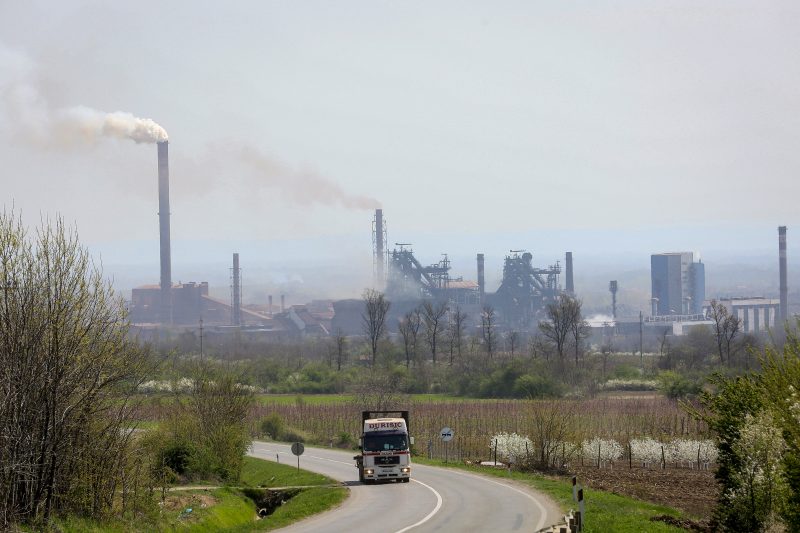As Balkans sit in EU’s waiting room, China gets to work
Chinese infrastructure investment in the Western Balkans has jumped in recent years, making the EU worry about Beijing’s influence just outside its borders
(OLIVER BUNIC)
Belgrade (AFP) – From coal plants to airports and bridges, China is forking out for investments across the Western Balkans, laying groundwork for a new battle for influence on the European Union’s fringe.
The West has long eyed Russia as its chief rival in this turbulent corner of southeast Europe.
But there is another major player in town, as Chinese firms fill development gaps in these cash-strapped countries, where dreams of entering the EU keep sliding towards the horizon.
The EU accounts for more than 70 percent of overall direct investment in the region — an area spanning Serbia, Bosnia, Montenegro, North Macedonia, Albania and Kosovo — far above the one percent contributed by China, according to European Commission figures.
But China has in the past six years leapt forward in infrastructure-related spending, rivalling the sums spent by the EU, and is otherwise making a noticeable impact.
In the Serbian steel town of Smederevo, 54-year-old mill worker Zoran Matic thanks “the Chinese — or as we call them, our friends”, for rescuing a factory that was on the brink of bankruptcy before China’s HBIS group bought it in 2014 for 46 million euros ($52 million at current rates).
“Wages are regular. The city has woken up,” adds his colleague Novica Djordjevic, standing outside the gate where China’s red flag flies.
The purchase was a triumph where Americans had foundered. Just two years earlier, US Steel sold the plant, and its debts, to the Serbian government for a symbolic $1.
Now production is growing and revenue was up 37 percent last year, according to the company.
Thrilled, Serbia’s President Aleksandar Vucic urged China to also take over a debt-hit copper mine farther south — which it did last year.
And the requests keep coming. In September, Vucic called for Chinese companies to invest in the tech sector and, ambitiously, turn Serbia into a hub for “flying cars”.
– Gateway to Europe –
As a gateway to southern Europe, the Balkans form a key link in Beijing’s “Belt and Road” project, a $1-trillion plan to pave a path for its exports to Europe and beyond.
Surrounded by EU member states, the region connects the Piraeus port in Greece — already controlled by the Chinese — to the heart of Europe.
But the massive concessional loans used to fund much of the building have drawn scrutiny in Brussels.
EU enlargement commissioner Johannes Hahn, who oversees bids to join the bloc, told AFP there are “concerns over the socioeconomic and financial effects some of China’s investments can have”.
He cited tiny Montenegro, where public debt shot up to more than 70 percent of its GDP after the country took an 809-million-euro loan from China’s state-owned Export-Import bank to build a highway through its mountainous terrain.
There’s fear the country could fall victim to “debt-trap diplomacy” — when nations that default on China’s loans are forced to hand over assets.
“These investments often come with strings attached,” Hahn said. “And that in return has an impact on our aim, namely to improve the stability and economic development” in the Balkans.
– ’16+1′ summit –
The Belt and Road projects will be centre stage at the annual “16+1” summit in Dubrovnik on Friday bringing together leaders from Beijing plus 16 eastern European countries, including five Western Balkan states.
In the West, the grouping has been eyed warily as a possible Chinese attempt to divide the bloc and gain leverage from within.
Beijing denies any geopolitical intentions and says it supports a united Europe.
But Brussels has started moving to curb the Asian giant’s reach.
In February, EU lawmakers voted in new screening of foreign investments, which will limit China’s ability to buy firms in the strategic technology and infrastructure sectors.
The Western Balkans, however, remains a open field outside the EU which has already attracted a significant chunk of the 16+1 investment.
Between 2007 and 2017 Beijing announced 12 billion euros in loans for construction projects in the 16 countries — a third of which were earmarked for Serbia, followed by Bosnia (21 percent) and Montenegro (seven percent), according to a European Investment Bank study.
Not all projects are guaranteed to materialise. Some, like a railway from Belgrade to Budapest, have already hit significant snags on Hungary’s side.
But according to an 2017 IMF study, China is financing at least 6.2 billion euros in railway, energy and road construction in the Western Balkans.
With less access to EU funding, the poorer Balkan countries are “not in a position to be turning money away”, explained Matt Ferchen, a China specialist at the Carnegie–Tsinghua Center for Global Policy.
– Cash for coal –
From an EU perspective, there is concern the Chinese model of investment — free of requirements that recipients tackle issues like corruption or press restrictions — will work against Brussels’ goals in the region.
For instance, China is also funding the expansion of coal-fired energy plants, bucking an EU trend away from fossil fuels.
Bosnian lawmakers are now under fire for approving a state guarantee this month for a 614-million-euro Chinese bank loan to upgrade a coal-fired power plant in Tuzla.
In a tweet, Hahn warned “issues like environmental impact assessments, state aid and public procurement procedures will certainly be closely looked at” as EU membership bids are evaluated.
The Energy Community, which is tasked with expanding EU energy policies to southeast Europe, has opened a complaint, saying the state guarantee violates subsidy laws.
But while Brussels wields red tape, local politicians cast China as coming to the rescue.
The Chinese loan is “a historic moment for Bosnia”, says Fadil Novalic, prime minister of the country’s Bosnian-Croat region.
“We have not had such an investment in 40 years.”
Disclaimer: Validity of the above story is for 7 Days from original date of publishing. Source: AFP.


